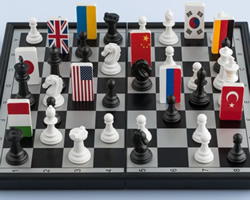Ron Huisken* says Russia’s invasion of Ukraine and China’s insistence on an authoritarian system of governance means at some point a collective reinterpretation of the world order must be negotiated.
 When Russia’s President, Vladimir Putin launched his ‘special military operation’ to invade and occupy neighbouring Ukraine last February, the world shuddered.
When Russia’s President, Vladimir Putin launched his ‘special military operation’ to invade and occupy neighbouring Ukraine last February, the world shuddered.
In a painstakingly premeditated manner, Putin stepped over perhaps the most foundational norm of the prevailing international order.
For approximately two decades, many sensed the gradual but relentless erosion of confidence in the principles, conventions, and processes designed to foster stability and peace.
The world shuddered because, on 24 February, it seemed the end game had abruptly come into view.
The rules-based order has emerged as a key axis of the intensifying animosity between the West and the China-Russia partnership.
Some 20 years ago, Beijing and Moscow voiced guarded expressions of support, an acknowledgement that the trade regime, in particular, was central to their aspirations for economic development.
Yet they also flagged a possible interest in unspecified amendments to the wider regime at some point in the future.
Only in recent times — essentially since 2020 — have China and Russia indicated more precisely where and how the rules-based order clashes with their interests and preferences.
The key points of contention emerging thus far concern economic competition, governance, and international security.
While disputes in and around the international trade agenda probably attracted the most attention, grasping them is at least straightforward.
Regarding governance and international security, the nature and intent of the Chinese and Russian positions is more challenging.
China has indicated that, while its system of governance is distinctive in a number of ways, it is unacceptable to question its legitimacy or equivalent status to those in the West.
China contends that a perfectly valid re-conceptualisation of democracy — and related concepts such as universal human rights — means its approach to governance is legitimate and effective.
Regarding international security, the China-Russia joint statement of 4 February spoke of an aspiration to shape “a polycentric world order based on the universally recognised principles of international law, multilateralism and equal, joint, indivisible, comprehensive and sustainable security”.
The last of these principles — especially the notion of indivisibility — was the core contention by Putin in support of the invasion of Ukraine.
Is there space for a constructive conversation on these matters? Finding that space is a challenge we must approach with creativity and humility.
The prevailing rules-based order has delivered massively across a broad front for more than 70 years, not least in preventing war between the major powers.
Presumably, therefore, the rewards for genuine engagement on a workable adaptation of the current order could be immeasurable.
No State should claim a monopoly on wisdom. No State should presume to be on the right side of history.
Democracies may be prone to slipping toward chaos as priorities and processes are lost in a scramble to indulge too many disparate aspirations.
However, no authoritarian leadership has ever dared offer a candid account of how to achieve and sustain the order and discipline it covets.
A first step must be to lower the barriers to easier communication, with all parties willing to learn and understand.
It would also be helpful to widen the band of participants in these international conversations so we get the confidence we are hearing the real story.
We already have a modest record of edging closer together on a range of the more sensitive issues on the international economic, political, and social agenda.
United States Secretary of State, Antony Blinken has noted that the prevailing order must modernise to address the challenges the framers of the order could not even imagine.
Even if we cannot identify a path to reconciliation, for both sides to acquire a deeper appreciation of the other’s perspective could prove an important shock-absorber.
The final, and definitive, reality: We must change our ways.
All empires have stemmed from a powerful, unfettered leadership that achieved compelling dominance and used that status to frame their ‘orders’ — Persian, Greek, Roman, Mongol, down to the United Kingdom and US.
All these leaders encountered the same dilemma: How to make the order suit the values and interests of the dominant power, while remaining sufficiently attractive to keep the costs of sustaining the order within manageable bounds.
Nuclear weapons have overtaken this traditional method of shaping an order.
They have destroyed the relationship between outcomes on the battlefield and any combination of numbers, technology, strategy, tactics, planning, judgment, effort, bravery, skill, and honour.
Compelling dominance has become much harder to achieve and capitalising on that dominance in a world with nuclear weapon States harder still.
The next iteration of the rules-based order, if there is to be one, must be the framed in some collective fashion.
*Ron Huisken is an Adjunct Associate Professor, Strategic and Defence Studies Centre, Australian National University, and Editor of the Council for Security Cooperation in the Asia Pacific’s Regional Security Outlook.
This article first appeared on the Pacific Forum International website.











